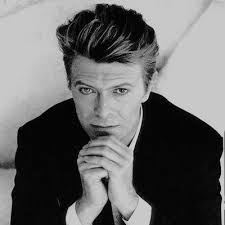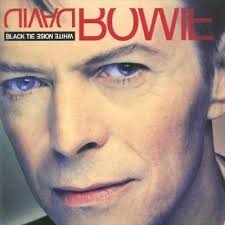BLACK TIE WHITE NOISE
| David BowieBLACK TIE WHITE NOISE
Black Tie White Noise is the 18th studio album by David Bowie. Released in 1993, it was his first solo release in the 1990s and his first solo album in nearly six years, after spending time with his hard rock band Tin Machine, retiring his old hits on his Sound+Vision Tour, and marrying supermodel Iman. This album was an attempt to make "a new kind of melodic form of house" music and featured his old guitarist from the Ziggy Stardust era,
Mick Ronson, who died of cancer 24 days after the album's release. This album was inspired by his own wedding and includes tracks such as "The Wedding" and its reprise at the end of the album as a song reflecting the occasion. The album is commonly viewed as the start of an artistic renaissance for Bowie, whose creative enthusiasm and career had suffered in the mid-to-late 1980s after a series of poorly received projects. Wikipedia
Critic Reviews
Show All-
 RollingStone
RollingStone
Black Tie White Noise both honors his own restless history and points the way to future risk, to brave changes yet to come.
-
 BBC
BBC
As an album, it was both a critical and commercial success (number one in the UK). As a statement of the next stage of Bowie’s career, it was perfect.
-
 ALL MUSIC
ALL MUSIC
Black Tie White Noise was the beginning of David Bowie's return from the wilderness of post-Let's Dance, the first indication that he was regaining his creative spark.
-
 sputnik music
sputnik music
Black Tie White Noise, Bowie genuinely begun to pick himself up out of the creative gutter and start the steady walk back towards the white lights of credibility.
-
 Only Solitaire
Only Solitaire
Bowie recreates himself as a typical Nineties star: bouncy, dancey, schmancey and... totally tasteless.
-
 John Mcferrin
John Mcferrin
Overall, though, this album has an awful lot of negatives going against it, and when I have to struggle for compliments in the parts that I don't instinctually hate, a bad grade is inevitable.
-
 Adrian Denning
Adrian Denning
The album comes across as an 80s leftover, and although is more impressive, slightly, than the previous few Bowie SOLO LPs, has all the same faults.
-
 Don Ignacio
Don Ignacio
as a Bowie fanboy, I am enormously disappointed in Black Tie White Noise.
-
 Wilson & Alroy's Record Reviews
Wilson & Alroy's Record Reviews
Bowie goes solo again, and of course immediately jumps on the nearest bandwagon - a weird blend of computerized dance music, hip hop, and jazz. Talk about pushing a formula: practically every track features the same combination of shuffling, mechanical drums; jarring hip hop samples; single synth notes held through the measures; blaring, Arabesque horns; and funky, but totally uptight bass parts.
-
 Medium
Medium
In a catalog of strange, unexpected moments, the duet with Al B. Sure is the strangest. That’s the only thing I remember about this album, and I just listened to it.
-
 UNCUT
UNCUT
Black Tie finds him on safer ground, earnestly tinkering at the camp interface of contemporary rock and soul. Sadly, it also heralds Bowie’s retreat into a hyper-sleek musical exoskeleton of studio perfection.
-
 Robert Christgau
Robert Christgau
Oddly enough, the music is the artiste's most arresting in many years; the dance beats and electrotextures make you prick up your ears and wonder where they'll lead.



Rate This Album and Leave Your Comments